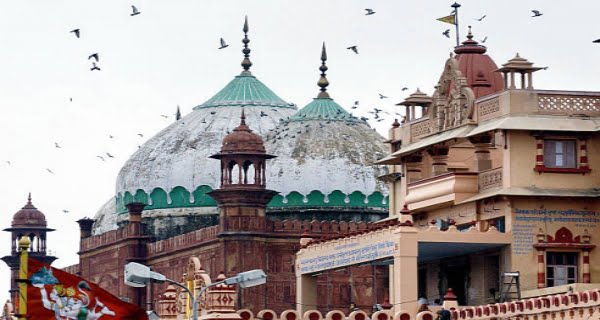In a generous offer, Sri Krishna Janmabhoomi Mukti Aandolan Samiti, in its application to the court of Mathura senior civil judge has offered a larger piece of land to the mosque management committee of the 17th century Shahi Masjid which stands on the birthplace of Lord Krishna.
Advocate Mahendra Pratap Singh, the president of Sri Krishna Janmabhoomi Mukti Aandolan Samiti, while speaking to The Indian Express said, “Intazamia Committee (management committee) would be offered a piece of land larger than the one on which Shahi Masjid Idgah stands.”
The offer is based on the condition that the mosque’s management committee has to agree to demolish the Mughal era structure voluntarily.
While Mathura courts are flooded with applications of removing mosque from the disputed site which is believed to be the birthplace of Lord Krishna, the moment has gained momentum after the historic Ram Janmabhoomi verdict with the apex body of saints and seers – the Akhil Bharatiya Akhara Parishad (ABAP) in September 2020 deciding to launch a campaign to free the Kashi Vishwanath temple in Varanasi and the Krishna Janmabhoomi in Mathura.
The Mughals destroyed thousands of temple complexes of India and built mosques on top of them or around them. The Kashi Vishwanath Mandir in Varanasi that was converted into the Gyanvapi Mosque, the Keshavnath temple in Mathura that was converted into Idgah Mosque, the Adinath temple in Malda that was converted into Adina Mosque, the Kali temple in Srinagar that was converted into Khanqah-e-Moula, among others, stand as prime examples of the same medieval plunder.
The Places of Worship (Special Provisions) Act, 1991 is a Parliamentary law that states that all places of worship, irrespective of religion, shall continue to operate, without hindrance and obstruction, as the exact worship sites which stood on August 15, 1947. By virtue of the same, for example, if a Mosque is built over a temple, and the superimposed structure existed as on 15th August 1947 in its present form, then no action can be taken to change the place of worship’s current form.
This means that in presence of this law, the Kashi Viswanath Mandir cannot be reclaimed by Hindus in its entirety because the Gyanvapi Mosque stood over it as of 15th August 1947. Section 4 (1) of the Act expressly provides, “It is hereby declared that the religious character of a place of worship existing on the 15th day of August 1947 shall continue to be the same as it existed on that day.” It is this precise clause which the current PIL filed before the SC wishes to nullify.
The Places of Worship Act was brought in 1991, by the then PV Narsimha Rao government, at a time when the Ram Mandir movement was at its peak. Its aim was simple – to be made to appear secular, however, to prevent Hindus from initiating a temple reclamation drive across India. While the Ayodhya dispute was exempted from the same, the other temples were declared out of bounds for Hindus to turn their eyes to.
The historic Ram Mandir verdict, however, has raised the aspirations of Hindus, who are now keen to get their major temples back.
